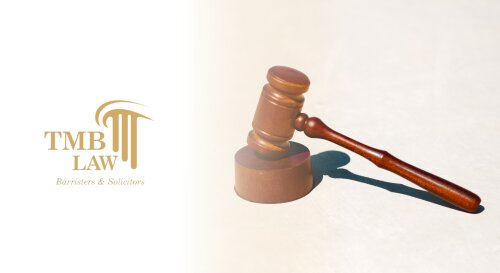Best Landlord & Tenant Lawyers in Oshawa
Share your needs with us, get contacted by law firms.
Free. Takes 2 min.
Free Guide to Hiring a Real Estate Lawyer
List of the best lawyers in Oshawa, Canada
About Landlord & Tenant Law in Oshawa, Canada
Landlord and tenant law in Oshawa, Canada, is governed by provincial legislation, primarily the Residential Tenancies Act (RTA). This law outlines the rights and responsibilities of landlords and tenants in residential rental agreements, including issues like rent increases, maintenance responsibilities, and eviction procedures. Understanding this legislation is crucial for both landlords and tenants to ensure compliance and protect their interests.
Why You May Need a Lawyer
There are several common situations where seeking legal advice from a lawyer experienced in landlord and tenant matters can be beneficial:
- Eviction Disputes: If you're facing eviction or need to evict a tenant, legal assistance can help navigate complex legal procedures.
- Lease Agreements: Drafting or reviewing rental agreements to ensure they are comprehensive and legally sound.
- Rent Increases: Understanding the legal limits and requirements for increasing rent.
- Maintenance and Repairs: Resolving disputes over who is responsible for repairs and maintenance.
- Security Deposits: Issues related to the collection, use, and return of security deposits.
- Discrimination Claims: Addressing claims of discrimination in rental practices.
Local Laws Overview
Here are some key aspects of local laws relevant to landlord and tenant relationships in Oshawa, Canada:
- Residential Tenancies Act (RTA): Governs most residential rental agreements, outlining the rights and responsibilities of landlords and tenants.
- Rent Control: Limits on how much and how often rent can be increased. Check the annual rent increase guideline.
- Eviction Notices: Legal requirements for serving eviction notices, including valid reasons for eviction and notice periods.
- Maintenance and Repairs: Obligations of landlords to maintain rental units in good repair and meet health and safety standards.
- Human Rights Code: Prohibits discrimination in housing based on various grounds, including race, gender, and disability.
Frequently Asked Questions
1. Can my landlord increase my rent at any time?
Rent increases are regulated by the Residential Tenancies Act. Landlords must provide 90 days written notice and can only increase rent once every 12 months based on the annual rent increase guideline.
2. What should I do if I receive an eviction notice?
If you receive an eviction notice, it's important to understand the reason for the eviction and the notice period. You may want to seek legal advice to explore your options, which may include disputing the eviction or negotiating terms with your landlord.
3. Who is responsible for repairs in my rental unit?
Landlords are generally responsible for maintaining the rental unit in good repair and ensuring it meets health and safety standards. However, tenants must also report maintenance issues and not deliberately cause damage.
4. How can I get my security deposit back?
Your landlord must return your security deposit within a specific timeframe after you move out, provided there is no damage or unpaid rent. If there are disputes, you may need to seek legal advice or file a claim with the Landlord and Tenant Board.
5. Can a landlord refuse to rent to me?
Landlords cannot refuse to rent to you based on discriminatory reasons outlined in the Human Rights Code, such as race, gender, or disability. If you believe you have faced discrimination, you may seek legal advice or file a complaint with the Human Rights Tribunal of Ontario.
6. What are my rights if my landlord enters my rental unit without notice?
Without proper notice, landlords are typically not allowed to enter your rental unit except in emergencies or specific circumstances outlined in the RTA. If your landlord enters without notice, you can seek legal advice to understand your options.
7. How do I contest a rent increase?
If you believe a rent increase is unfair or exceeds the allowable amount, you can file an application with the Landlord and Tenant Board to contest it.
8. What notice is required for ending a tenancy?
Notice periods vary depending on the reason for ending the tenancy. Tenants usually need to provide 60 days' notice, and landlords must follow specific procedures and notice periods for evictions.
9. Can I withhold rent if my landlord doesn’t make necessary repairs?
Withholding rent can lead to eviction. Instead, seek legal advice or file a maintenance application with the Landlord and Tenant Board to address repair issues.
10. How can I make a claim for damages caused by my landlord?
If your landlord has caused damages, you can file a claim with the Landlord and Tenant Board or seek legal advice to pursue compensation through the courts.
Additional Resources
For further information and assistance, consider the following resources:
- Landlord and Tenant Board (LTB): Provides information and services related to rental disputes and applications.
- Ontario Human Rights Tribunal: Handles complaints of discrimination in housing.
- Community Legal Clinics: Offer free legal advice and representation to low-income individuals.
- City of Oshawa Housing Services: May provide additional local resources and support.
Next Steps
If you need legal assistance in landlord and tenant matters, consider taking the following steps:
- Gather all relevant documentation, including lease agreements, notices, and correspondence.
- Contact a lawyer experienced in landlord and tenant law to discuss your situation and receive tailored advice.
- Utilize local legal resources like community legal clinics for free or low-cost legal support.
- Visit the Landlord and Tenant Board website for guidelines, application forms, and information on your rights.
Taking these steps can help you effectively address your landlord and tenant legal issues and protect your rights.
Lawzana helps you find the best lawyers and law firms in Oshawa through a curated and pre-screened list of qualified legal professionals. Our platform offers rankings and detailed profiles of attorneys and law firms, allowing you to compare based on practice areas, including Landlord & Tenant, experience, and client feedback.
Each profile includes a description of the firm's areas of practice, client reviews, team members and partners, year of establishment, spoken languages, office locations, contact information, social media presence, and any published articles or resources. Most firms on our platform speak English and are experienced in both local and international legal matters.
Get a quote from top-rated law firms in Oshawa, Canada — quickly, securely, and without unnecessary hassle.
Disclaimer:
The information provided on this page is for general informational purposes only and does not constitute legal advice. While we strive to ensure the accuracy and relevance of the content, legal information may change over time, and interpretations of the law can vary. You should always consult with a qualified legal professional for advice specific to your situation.
We disclaim all liability for actions taken or not taken based on the content of this page. If you believe any information is incorrect or outdated, please contact us, and we will review and update it where appropriate.










